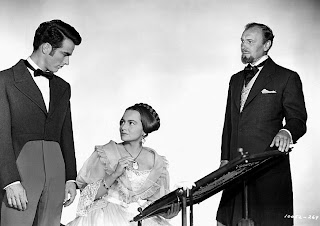Every now and then your correspondent can only shake his head in wonderment at the good people at The New Yorker.
For example it’s not unusual for Adam Gopnik, the magazine’s resident Renaissance man, to say something utterly and completely off the deep end. And the art criticism in the magazine sometimes seems predicated on nothing more than insisting that Modernism is still relevant, gosh-darn-it, and you had better believe it because we at the New Yorker say it’s so. And as for its film criticism …, well, let’s say that, like most Puritans, New Yorker film critics suffer from the sneaking suspicion that some one, some where is having a good time.
So I was not greatly surprised when I found in the latest issue an especially witless essay by Arthur Krystal on “guilty pleasures” in fiction. (“Easy Writers,” May 28, page 81.) Now, let me say upfront that I certainly believe that there is such a thing as good art and bad art. Indeed, The Jade Sphinx is predicated on the very notion that there is a hierarchy in art. However, your correspondent must part company with Krystal when he uses the idea of genre fiction as his baseline for gauging a guilty pleasure.
Now, as Oscar Wilde, patron saint of our blog wrote, “there is no such thing as moral or immoral book. Books are well written or badly written. That is all.” I’m sure the ghost of Wilde would forgive us if we also observed that there is no such thing as a novel that is a guilty pleasure or not a guilty pleasure – again, novels are well written or badly written. What astonishes me is not that Krystal is so far off the mark … but that we, in 2012, are still having the discussion at all.
One hundred or so years ago, our intellectual and aesthetic betters knew this. Bookstores were not broken into ghettos of mysteries, young adult novels or science fiction stories. Indeed, the new H. G. Wells novel was set alongside the new book by Henry James, and Arthur Conan Doyle shared shelf space with Joseph Conrad. If you want to make the argument that a mere genre story could never be art, let’s admit that Hamlet is a crime story (and a rather good one at that) and Macbeth a fantasy (ditto) and start relegating Shakespeare to the proper literary ghettos.
Even more amusing is that Krystal seems to have little understanding of what fiction is or what it does. Here’s a sample: “Skilled genre writers know that a certain level of artificiality must prevail, lest the reasons we turn to their books evaporate. It’s plot we want and plenty of it. Heroes should go up against villains (sympathetic or hateful); love should, if possible, win out; and a satisfying sense of closure and comeuppance should top off the experience. Basically, a guilty pleasure is a fix in the form of a story, a narrative cocktail that helps us temporarily forget the narratives of our own humdrum lives.” In that brief passage, Krystal has relegated to “genre fiction” nearly the entire corpus of Charles Dickens and Jane Austen. No small feat, that.
However, even a stopped clock is right twice a day, and Krystal does make one intelligent observation: “Modernism, of course, confirmed the idea of the commercial novel as a guilty pleasure by making the literary novel tough sledding.” He mitigates the quality of the observation by implying that perhaps, this is the way things should be. Indeed, “serious fiction was serious business, and a reader might tire of it.”
Well, he’s half right, at any rate. Most contemporary literary fiction is virtually unreadable. (The New Yorker is an especially egregious offender in this regard: often, the short fiction reads as if it were missing the opening and closing paragraphs.) I remember emerging from Susan Sontag’s “novel” The Volcano Lover, for instance, with all the cheer of one who had been repeatedly battered about the head and face. David Leavitt, Toni Morrison (fit punishment, really, only for serial murderers and repeat sex offenders), Cormac McCarthy and Annie Proulx have all written their share of unreadable books adored by the literati. And if this is the current state of literature, I think I’ll hide deep within the pages of Edgar Rice Burroughs until the whole thing blows over.
However, I am being too hard on Krystal, as he closes his essay with an apology to genre fiction: “Such writers have a gift that is as mysterious to nonwriters as plucking melodies out of thin air is to nonmusicians. Plotting, inventing, creating characters, putting words in their mouths and quirks in their personalities – it all seems pretty astonishing to me. The prose may be uneven and the observations about life and society predictable, but, if the story moves, we, always involuntarily, move with it. And, if we feel a little guilty about getting so swept up, there’s always ‘The Death of Virgil’ to read as penance.”


